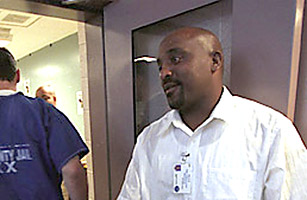
From your point of view, what was 1992 Los Angeles like?
My perspective was that there was a lot of things taking place and it was like a capsule waiting to bust. People were upset, people had no chance to vent, and nowhere to vent.
Crips and Bloods have spent years warring with each other, how did you get them to come together?
There were a lot of relationships formed in the streets. When I was in the street negatively, I had relationships in the neighborhood that I kept alive after I straightened out. This opportunity came together at what was an unfortunate time for Rodney King, but I refer to it as a blessing because if it weren't for that, I don't know if some of the guys together today would have been together.
So what was the impact in the neighborhood?
It was to a point where it was a silent thing, nobody said anything. But in the community, people were elated because it gave peace a chance to set in. People believed that Bloods and Crips couldn't come together, but they saw individuals from different neighborhoods walking together, hand in hand. It had to be God's plan.
So this is what spawned UNITY One?
Yes, definitely. People got together from all walks. We took about 700 people from the West side over to Watts and enjoyed the celebration with them. You see, for a long time, we had already been thinking about this and we wanted to come together and do certain things. Individuals who wanted to come together utilized that opportunity. From 1992, relationships from Watts to the West Side really started to improve, the barriers were broken.
So what did your group change exactly?
The thing that's changed now is the consciousness of the African American and Latino males that were heavily involved in gangs. Many have stepped up. Many are involved in intervention. They are working with the city, county and state, and they've been on point.
But right now, the stats for gang-related crime are still pretty bad in L.A. You still seem to have your work cut out for you?
There's still so much work to do. With the dropout rate in the high schools you have a new dynamic of young people hanging out with nothing to do. Countywide that's a large number when you look at servicing the 400 to 500 dropping out of each school each year.
So who should be the ones trying to turn them around?
Right. How do you get those young people to focus on job training, schools? Somebody has to counsel them and it can't be cops or preachers. They aren't scared to go to jail, so who is it? Who's there to do the work? Those same guys from 1992.
You're now doing your own call-in radio show on L.A.'s KRBV-FM. What are you learning from your conversations?
The mentality of the community hasn't changed much. But many have been consistently dealing with it. The only way things will change is for the ones in the community to get involved. We've never stopped, we've kept on going. But if the mentality doesn't change, that community will smother itself.
Back in 1992, the major anger in the neighborhoods was with the L.A.P.D. Would you say it is better or worse?
Well the relationships with law enforcement, in some places it's better than it was, in others its worse. The improvements have come because of the ones who have stepped up, like Homies Unidos, Venice 2000. We sit down with law enforcement all the time and Sheriff (Lee) Baca has been a strong advocate of UNITY One because of our intervention.
So what will your legacy be?
Five years from now, ten years from now, people will know there were a bunch of men who stepped up and got involved and became a part of the change. Because of that, they get to live in a decent community.